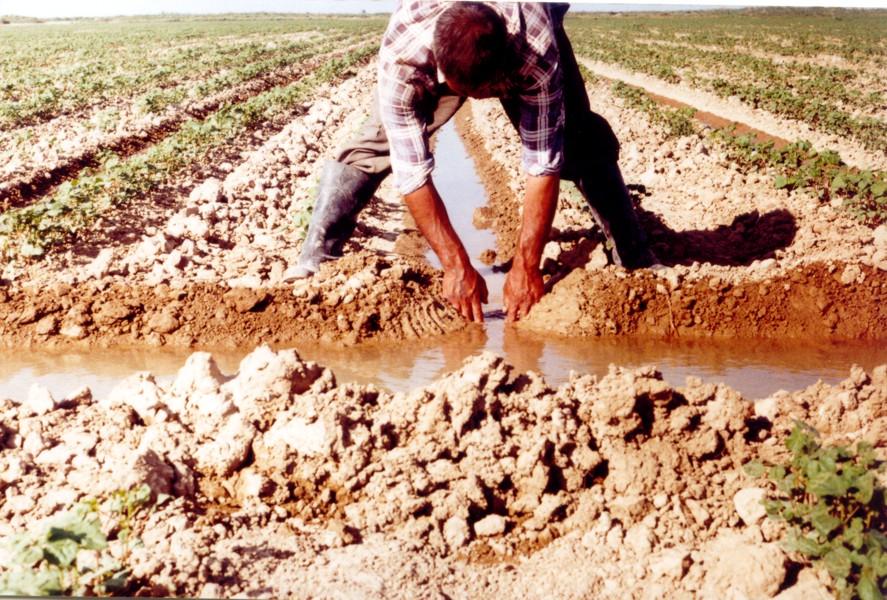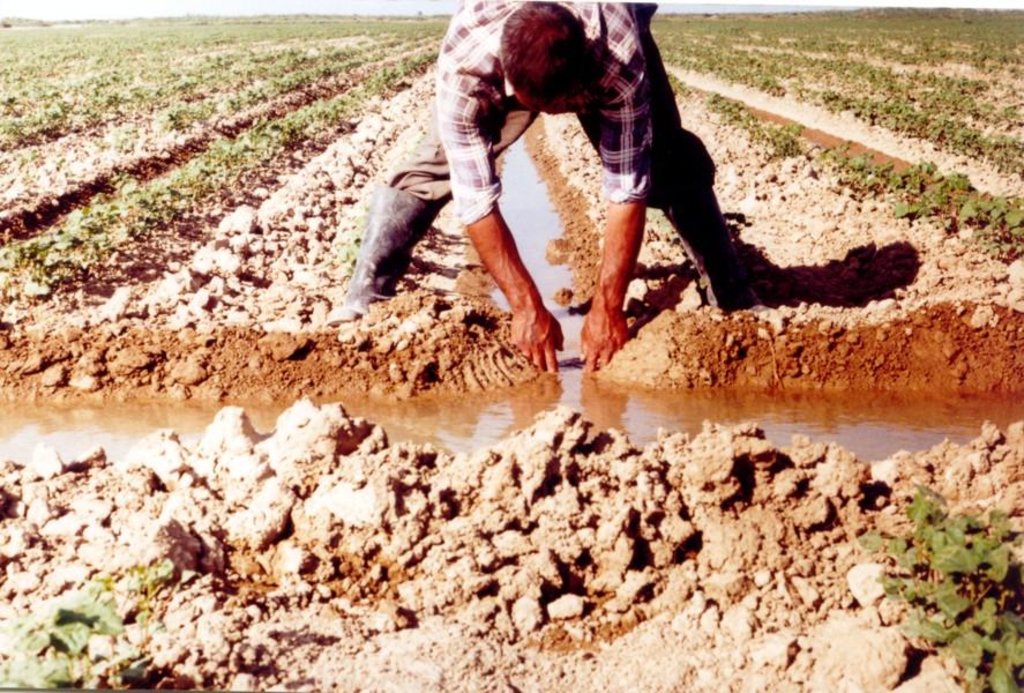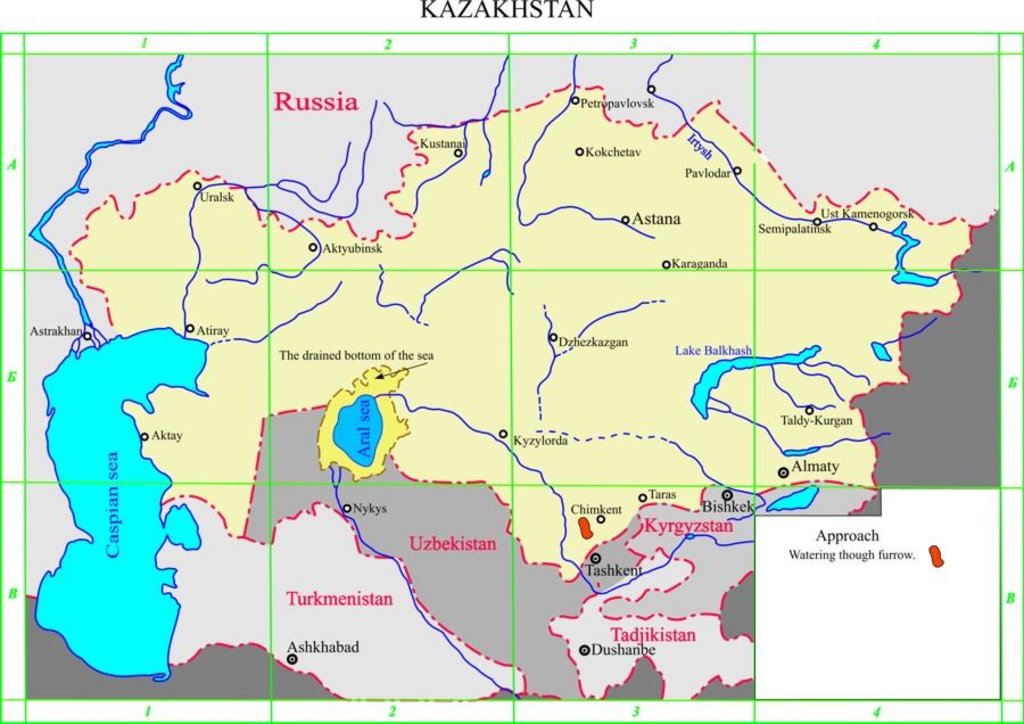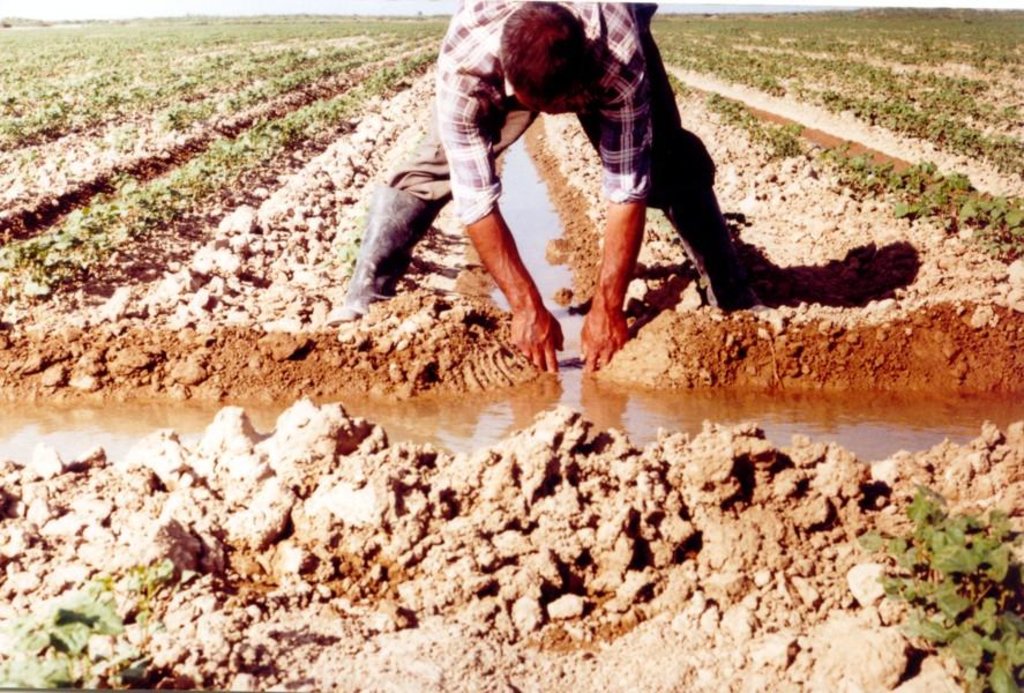Watering through furrow [Kazakhstan]
- Création :
- Mise à jour :
- Compilateur : Unknown User
- Rédacteur : –
- Examinateur : Fabian Ottiger
approaches_2364 - Kazakhstan
Voir les sections
Développer tout Réduire tout1. Informations générales
1.2 Coordonnées des personnes-ressources et des institutions impliquées dans l'évaluation et la documentation de l'Approche
Personne(s) ressource(s) clé(s)
Spécialiste GDT:
Vyshepolskey Franc
2-47-78,
Kniv@nursat.kz
SRI for Water Management
12 Koigeldy str Jambul area, Taraz city 484022
Kazakhstan
Nom du ou des institutions qui ont facilité la documentation/ l'évaluation de l'Approche (si pertinent)
Kazakh Research Institute for Soil Science and Agr (Kazakh Research Institute for Soil Science and Agr) - Kazakhstan1.3 Conditions relatives à l'utilisation par WOCAT des données documentées
Le compilateur et la(les) personne(s) ressource(s) acceptent les conditions relatives à l'utilisation par WOCAT des données documentées:
Oui
1.4 Références au(x) questionnaire(s) sur les Technologies de GDT
2. Description de l'Approche de GDT
2.1 Courte description de l'Approche
Watering through furrow
2.2 Description détaillée de l'Approche
Description détaillée de l'Approche:
Aims / objectives: To the developing of irrigated agriculture in a valley of the river Syr-Darya is interfered the deficiency of water resources. The problem of stabilization of an agricultural production is solved due to using of the SWC approach 'watering through furrow'.
Methods: The approach provides a necessary level of accumulation of a moisture into the soils for reception of guaranteed crops. Water supply is carried out by means of watering through furrow on a farmlands from conditions of saturation of 1.5 meter layer up to a field moisture capacity. At absence of financing for reconstruction of irrigating system the water availability of the irrigated soils raises due to optimization of the watering elements. For this purpose on an irrigated field are laying furrows long 150-400 m., the distances between furrow can change from 0.7 up to 0.9 meter. Width of a furrow on top 35-40 sm., and depth from 12 up to 17 sm., depending on slope of surfaces of the ground. Experience shows that the effect of uniformity of humidifying of ground is reached at the consumption of water of 0.9 liter/sec (quantity of absorbing water in the end of furrow to absorbed volume in head). Depending on agromeliorative properties of soil, can vary from 1.1 up to 0.7 liter/sec. In view of control of a water stream at watering through furrow, make a reinforcing of headstalls of irrigating furrows by cellophane napkins (50*50sm), irrigation tubes. Watering through furrow allows to reduce the losses of water to a filtration in 2 times, on dump and evaporation in 1.5 times. Due to reduction of these losses it is possible to improve water-availability of other irrigated masses on 20-30%. The given approach allows to save water resources to apply widely technique, provides high germination and survival of cultivated cultures, and save a manpower. The soil-cultivating technique passes on dry furrow and provides high quality of interrow cultivating of soils. The waterier easily moves on a field (dry furrows) and carries out duly redistribution of water in furrows, that improves quality of watering, operating conditions of a drainage, raises uniformity of humidifying soils, reduces expanses of water for reception of unit of agricultural production.
2.3 Photos de l'approche
2.5 Pays/ région/ lieux où l'Approche a été appliquée
Pays:
Kazakhstan
Région/ Etat/ Province:
Southern-Kazakhstan
2.6 Dates de début et de fin de l'Approche
Indiquez l'année de démarrage:
2000
2.7 Type d'Approche
- traditionnel/ autochtone
2.8 Principaux objectifs de l'Approche
The Approach focused on SLM only (Conjoining of humus horizone, deficiency of water, heavy loams, secondary salinization, filtration)
Water resources management and optimization of the watering superficial technologies of the irrigated grounds.
The SLM Approach addressed the following problems: 1. Water conservation 2. Maintenance of guaranteed crops
2.9 Conditions favorisant ou entravant la mise en œuvre de la(des) Technologie(s) appliquée(s) sous l'Approche
disponibilité/ accès aux ressources et services financiers
- entrave
Lack of mean for reconstraction of irrigating system
Treatment through the SLM Approach: Introduction of the SWC technologies
cadre institutionnel
- entrave
Absense of essential measures on water-division
Treatment through the SLM Approach: There are created the Regional structures-BWA (Basin Water Associations)
3. Participation et rôles des parties prenantes impliquées dans l'Approche
3.1 Parties prenantes impliquées dans l'Approche et rôles
- exploitants locaux des terres / communautés locales
Working land users were mainly men (Proprietors on the ground are basically men), Having small plots of the graunds (till 1 ha)
- organisation internationale
farms associations
3.2 Participation des exploitants locaux des terres/ communautés locales aux différentes phases de l'Approche
| Participation des exploitants locaux des terres/ communautés locales | Spécifiez qui était impliqué et décrivez les activités | |
|---|---|---|
| initiation/ motivation | aucun | |
| planification | passive | public meetings, interviews/questionnaires |
| mise en œuvre | passive | responsibility for minor steps; anxiety for the plots and for the future income |
| suivi/ évaluation | aucun | |
| Research | aucun |
3.4 Prises de décision pour la sélection de la Technologie/ des Technologies
Indiquez qui a décidé de la sélection de la Technologie/ des Technologies à mettre en œuvre:
- principalement les spécialistes de la GDT, après consultation des exploitants des terres
Expliquez:
The initiative of expertsof SRI (Scientific Research Institute)
Decisions on the method of implementing the SLM Technology were made by by SLM specialists alone (top-down). Development of the SWC land users
4. Soutien technique, renforcement des capacités et gestion des connaissances
4.1 Renforcement des capacités/ formation
Une formation a-t-elle été dispensée aux exploitants des terres/ autres parties prenantes?
Oui
Spécifiez qui a été formé:
- exploitants des terres
- politicians/decision makers
Formats de la formation:
- sur le tas
- entre agriculteurs (d'exploitants à exploitants)
Thèmes abordés:
Geology, soil scince, ecological hydrology
4.2 Service de conseils
Les exploitants des terres ont-ils accès à un service de conseils?
Oui
Décrivez/ commentez:
Advisory service is very adequate to ensure the continuation of land conservation activities; SRI has the qualified professionals carable to create service of training on places (farms)
4.3 Renforcement des institutions (développement organisationnel)
Des institutions ont elles été mises en place ou renforcées par le biais de l'Approche?
- oui, modérément
Spécifiez à quel(s) niveau(x), ces institutions ont été renforcées ou mises en place:
- local
Précisez le type de soutien:
- renforcement des capacités/ formation
4.4 Suivi et évaluation
Le suivi et l'évaluation font ils partie de l'Approche? :
Oui
Commentaires:
bio-physical aspects were ad hoc monitored through measurements
economic / production aspects were ad hoc monitored through observations
There were several changes in the Approach as a result of monitoring and evaluation: Ther were developed some approaches of management of a water stream in irrigating furrow by means of reinforcing its heads (cellophane napkins, irrigation tubes, siphons)
4.5 Recherche
La recherche a-t-elle fait partie intégrante de l’Approche?
Oui
Spécifiez les thèmes:
- écologie
- technologie
Donnez plus de détails et indiquez qui a mené ces recherches:
For the varius types of soil there were developed the norms of watering, a mode of an irrigation of adricultural crops and optimization of technologies of superfisial watering
Research was carried out on-farm
5. Financement et soutien matériel externe
5.1 Budget annuel de la composante GDT de l'Approche
Si le budget annuel précis n'est pas connu, indiquez une fourchette:
- < 2 000
Commentez (par ex. principales sources de financement/ principaux bailleurs de fonds):
Approach costs were met by the following donors: government (national - Kazakhstan SRI): 95.0%; local community / land user(s) (Akimat): 3.0%; other (Separate farmers): 2.0%
5.2 Soutiens financiers/ matériels fournis aux exploitants des terres
Les exploitants des terres ont-ils reçu un soutien financier/ matériel pour la mise en œuvre de la Technologie/ des Technologies?
Oui
5.3 Subventions pour des intrants spécifiques (incluant la main d'œuvre)
- équipement
| Spécifiez les intrants subventionnés | Dans quelle mesure | Spécifiez les subventions |
|---|---|---|
| machines | en partie financé | |
| irrigation net | en partie financé | |
Si la main d'œuvre fournie par les exploitants des terres était un intrant substantiel, elle était:
- volontaire
Commentaires:
Interest of farms in reception of guaranteed crops
5.4 Crédits
Des crédits ont-ils été alloués à travers l'Approche pour les activités de GDT?
Non
6. Analyses d'impact et conclusions
6.1 Impacts de l'Approche
Est-ce que l'Approche a aidé les exploitants des terres à mettre en œuvre et entretenir les Technologies de GDT?
- Non
- Oui, un peu
- Oui, modérément
- Oui, beaucoup
The approach of watering through furrow, and also techniques on management of a water stream in furrows (film, napkins, tubes)
Est-ce que l'Approche a amélioré les questions foncières et des droits d'utilisation qui entravent la mise en œuvre des Technologies?
- Non
- Oui, un peu
- Oui, modérément
- Oui, beaucoup
Did other land users / projects adopt the Approach?
- Non
- Oui, un peu
- Oui, modérément
- Oui, beaucoup
State SPC, the Ministry of Agriculture recommends self-covernment institutions, coommittees of a Water Management and Agriculture to use developed by the SWC approach the norms of irrigating and applications of ways of reinforcing of irrigation furrows
6.3 Durabilité des activités de l'Approche
Les exploitants des terres peuvent-ils poursuivre ce qui a été mis en œuvre par le biais de l'Approche (sans soutien extérieur)?
- oui
6.4 Points forts/ avantages de l'Approche
| Points forts/ avantages/ possibilités du point de vue de l'exploitant des terres |
|---|
| Opportunity of application of the SWC approach on various types of soil with a mode of humidifying (How to sustain/ enhance this strength: To give an explication of the soil as humidifying) |
| To duplicate (to expand) application of the SWC approach (How to sustain/ enhance this strength: To raise grants possibility) |
| Points forts/ avantages/ possibilités du point de vue du compilateur ou d'une autre personne ressource clé |
|---|
| Loses of water to a filtration are reduced (How to sustain/ enhance this strength: Improvement of technologies of superficial irrigation) |
| Saves water consumption (How to sustain/ enhance this strength: Expansion of an area of application of the SWC approach) |
| Improves well-being of local population (How to sustain/ enhance this strength: Propagation of the SWC approach and training of farmers) |
6.5 Faiblesses/ inconvénients de l'Approche et moyens de les surmonter
| Faiblesses/ inconvénients/ risques du point de vue du compilateur ou d'une autre personne ressource clé | Comment peuvent-ils être surmontés? |
|---|---|
| The account of a slope of surface of allotments is insufficiently fulfilled | Creation of the maps of land using with the indicatin of a slope of surface |
7. Références et liens
7.1 Méthodes/ sources d'information
- visites de terrain, enquêtes sur le terrain
- interviews/entretiens avec les exploitants des terres
Liens et modules
Développer tout Réduire toutLiens
Aucun lien
Modules
Aucun module trouvé





